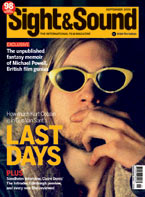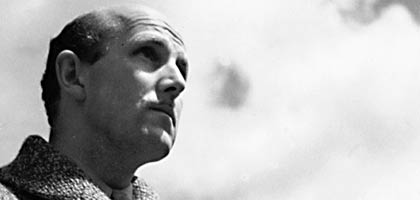Primary navigation


Michael Powell is a lead candidate for Britain's greatest-ever film-maker. To commemorate the centenary of his birth, in this month's edition of Sight & Sound, we publish for the first-time ever Powell's semi-fictional memoirs. In this exclusive unfinished fantasia, written at a time when he was down on his luck as a filmmaker, Powell describes his life in the studio, his love of women and his passion for cinema.
Here, Ian Christie explains how Powell channelled his frustrations into writing these memoirs.
All film-makers have a visible and an invisible career. Michael Powell probably had fewer early unrealised projects than most, but in the 1950s the balance changed and too much of his later career consisted of chasing chimeras and writing scripts that would never be made. From William Sansom's 'The Loving Eye', a Kensington romance that could have starred Paul Scofield and Natasha Parry, to Michael Frayn's 'The Russian Interpreter' with Peter Sellers; or 'The Tempest' with James Mason, Frankie Howerd and Mia Farrow - what riches lost to British cinema! And for television, collaborations with Dylan Thomas, Stravinsky, Graham Sutherland, Mervyn Peake - all sketched with optimism but ignored, until Francis Coppola and Martin Scorsese offered Powell the sanctuary and recognition denied him in Britain.
The only happy product of this long period of frustration was his determination to write about what it was really like to be a film-maker when cinema was at its zenith. And at the same time to write an uninhibited memoir of his life as an artist, a gypsy, a mountebank, and a truly sensuous man. Powell's willingness to write frankly about the many women he had loved, and who had loved him, struck a note that jarred with some. It seemed very pre-1960s - and very Powell, in its innocent willingness to shock.
The earliest draft of Powell's memoir dates from 1956, when his partnership with Emeric Pressburger was crumbling, and is called 'Prisoner at the Bar'. It's a dramatised self-evaluation in which he boldly declares that there are only five great film-makers - Griffith, Fairbanks, Chaplin, Disney and René Clair - and rates himself "one of the best". Two years later the framework has changed to a nocturnal meditation in the cutting room, where editing serves as a controlling metaphor for scrolling back through a life-stock of scenes.
Powell was always sceptical about documentary and believed in the higher power of the imagination: better colourful lies than mere journalism. The 1973 version of his memoirs published here retains the dramatic structure of an editing-room fantasia, weaving recollection, history and fantasy into the beginning of a novel that could have stood comparison with Christopher Isherwood's 'Prater Violet'. Between 1970 and 1973 in successive drafts Powell switched from third-person to first-person narration. The die was cast in favour of memoir - and we have 'A Life in Movies' (1986) and its posthumous sequel 'Million-Dollar Movie' to be grateful for. But the earliest working title was 'The Storytellers' and that remained Powell's goal: to tell the adventure of cinema in a way we wouldn't forget.